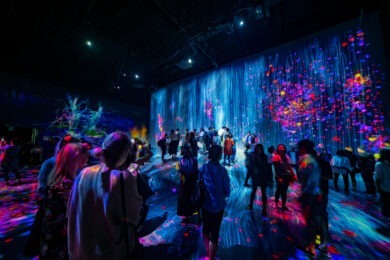New ideas and technologies set to shake things up in 2024
Our industry declared the pandemic was a long-awaited opportunity to reimage events and brand experiences. But what really happened? Through the challenges of the reopening world and the joy of reunions, our industry mostly picked up its 2019 playbooks and went back to its comfort zone. While we aren’t yet seeing the realization of innovation in a big way, there are promising signs of a new era emerging.
Across The Opus Group agencies, we are seeing new engagement strategies and technologies starting to gain steam, indicating that a return to prioritizing innovation is on the horizon for 2024. Two forces driving innovation are (1) the demand for something new and interesting, and (2) the shift from tech designed for the event organizer to tech designed for the audience experience.
Read More: Salman Rushdie and Complacency in the Meetings Industry
1. Demand for Something New
Humans are experiencing technological innovation at warp speed. The rising popularity of AI in its endless applications is challenging the status quo and bringing important questions to the forefront of our conversations. New technology is changing how we do business and exchange currency; it’s creating new realities that change how people engage with the world. And it’s changing the expectations that people have for the events and experiences they attend.
Attendees and event leaders are ready and hungry for something new, exciting, memorable, and shareable, and the demand for event innovation is rumbling beneath the surface. This new demand for innovation among event attendees and planners creates an environment where the industry must adapt to stay ahead of the curve. This healthy pressure is encouraging event leaders to experiment with new formats and concepts and welcomes their wildest ideas.
One area in particular where brands are searching for innovation is in their third-party events. While RSAC, C2 Montreal, Coachella, and SXSW have been leading tentpole events in third-party portfolios, there is a growing demand for new options. Clients are looking for visionary events beyond the most expected ones.
Our team has its eye on Collision, a high-growth technology conference from Web Summit that has become a can’t-miss industry event. With more than 40,000 attendees from 140 countries, Collision’s unique emphasis on shaping the future of the tech industry is particularly notable as it brings together 2,000-plus startups and blue-chip companies from countless sectors to participate in pitch sessions, startup competitions, and investor meetings that are framing the future of tech-trends. Collision’s focus is a fresh take within the tech-event space, and the world’s leading brands have taken notice.
The pandemic also highlighted gaps, and therefore opportunities, in the marketplace, particularly around the potential for new events, shows and types of programs that appeal to different audiences or drive different outcomes. One example from Opus Agency is its partnership with the Nashville Health Care Council to strategize the Nashville Healthcare Sessions, which is being touted as “the SXSW of healthcare.” Across The Opus Group, we are working with clients to develop new events that take unique, thoughtful approaches to engage with today’s attendees.
The re-energized demand for something new or unique isn’t the only factor in driving innovation; event leaders are also shifting their mindset from investing in technology designed with the event planner in mind back to prioritizing technology focused on the attendee experience.
2. Refocus on Attendee Experience
Over the last few years, innovation has focused more on building value and investment returns for event organizers than attendees. In 2019, we put attendee tools and experience front and center. It was the most crucial part of everything we did. In 2020, it was (and still is) all about platforms. We went from technology that created an engaging attendee experience to technology that made life easier for event organizers and hopefully captured relevant data.
Today, platforms are like the new Event Operating Systems. It’s all event organizers seem to talk about, and it’s where event tech spending has gone for the last few years. But the reality is that this organizer-centric technology perspective has left the attendee experience behind, and the ability to connect insightful, actionable data is still a gap.
So, now that the reunions are behind us, how can we get back to FOMO and surprise-and-delight moments? How do we immerse attendees in spaces and help them explore and find joy? It’s time to truly break out of our comfort zone. With constant new tech innovations popularizing our daily lives, event professionals must harness these new technologies to enable and enrich the attendee experience. Event marketers and planners are uniquely trusted among stakeholders to understand human behavior; to try new things, guide new opportunities and generate demand for innovation that delivers results. If we continue to do that, we will elevate our brands and attendees’ experiences.
Let’s dive into some of the newest, most inspiring innovations and applications that will elevate attendees’ experiences. The list below includes some of the favorite new technologies across The Opus Group network at Opus Agency, MAS, TENCUE and Verve.
- Radius: A platform that allows attendees to receive digital content based on their physical location. The platform uses GPS technology to create scavenger hunts, wayfinding, rewards, and other exciting features, and it can easily integrate with existing apps. For example, Radius can enable attendees to pick up drink vouchers at tradeshow booths and then navigate them to the bar. Sponsors can also drop white papers at expos, and attendees can receive mobile badges when they enter a venue.
- Lagoon Live: A platform that uses NFT technology to mint rewards based on interactions across multiple events and sponsors. Lagoon Live takes gamification to the next level and offers content drops, polling, games, AR, and a persistent leaderboard. It also features a dashboard to view engagement data and target individual attendees for one-off reward drops.
- ARway: While not a new tool, it uses GPS instead of outdated Bluetooth beacon technology. The platform allows attendees to see accurate directions based on their location. Indoor spaces can be mapped and tagged with QR codes to help the app orient itself. You can upload floor maps, customize layouts, and brand your event from the admin panel.
- InEvent: This industry-trusted platform has integrated with ChatGPT to automate outbound marketing. With your event data already inside the platform, the new system can draft content to help drive demand and communications for your event.
- Midjourney: A platform that takes the notion of image generation from text prompts to new horizons. AI-generated images are fed examples of high-res imagery over a long period to learn different styles and techniques, making it a solid tool for designing creative environments.
Read More: ChatGPT Does It All
- SolidLight: While holograms aren’t new to the industry, recent developments have turned up the heat. Live-action holographic on-site customer service is rising in popularity, and beaming in remote executives for on-stage interactions looks sharper than ever before. New technologies, like SolidLight from Light Field Lab, combine unprecedented resolution and density to project dimensional wavefronts that seemingly form solid objects that merge with reality.
- Screens: ASUS rolled out a glasses-free OLED 3D laptop that uses eye-tracking technology to focus the 3D object for the viewer. LG announced a large-scale wireless LED display, and Muxwave developed transparent LED display tech that can be attached to windows, turning glass panels into display panels.
And the next next-gen of technology innovation? That might look like silicon metasurfaces for displays, lasers that can write in mid-air, shapeshifting drones, and biocomputers powered by human brains.
Brands and attendees both want new experiences, and as we roll into 2024, we expect to see some exciting new experiments, ideas, concepts, and leaders take the stage. The event industry is one of peer influence and fast followership, and taking risks and trying new things can be challenging. However, the rolling snowball of innovation is building, and it is time to embrace it.
As I look to the future of the event industry, I expect to see a world of possibilities open up before us. I am so excited to champion those that are not limited in their creativity; those that are eager to explore, experiment, adapt and grow. From small-scale events to massive festivals, the boundaries of what is possible will expand, and we will be the ones to reap the rewards. So, get ready to step into a new era of experience where the only limit is our imagination.
—
Kim Kopetz is a results-oriented leader with over 20 years of global brand and event marketing experience. As president and chief operating officer of The Opus Group, she actively builds and refines teams for maximum efficiency across an award-winning network of event and experience agencies that includes Opus Agency, MAS, Tencue and Verve.
Kopetz has worked in various roles at The Opus Group since 1998 and with global brands like Intel, Nike, and the NBA. Since 2017, she has overseen the acquisition and integration of eight agencies, positioning The Opus Group as a global leader in experiential marketing.




